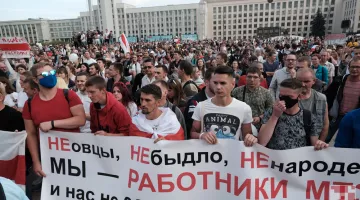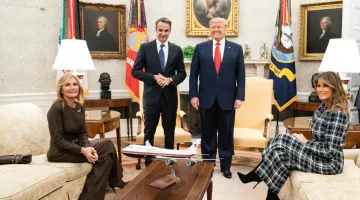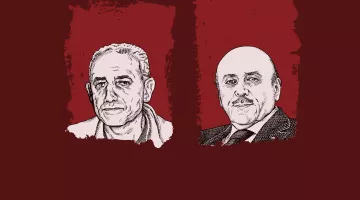Autocracy 2.0
Brutal dictatorships present themselves as modern and open for business. And lobbying firms from democratic western countries help create that illusion, says Mike Harris

Brutal dictatorships present themselves as modern and open for business. And lobbying firms from democratic western countries help create that illusion, says Mike Harris
In the Soviet era, there was an idiom that combined the prevailing communist ideology of the day with slang and archaic sayings. The normal rules of grammar were replaced with stilted, guarded sentences so those in positions of authority could say as little as possible, in as many words as possible. Today, in autocratic post-Soviet nations such as Azerbaijan, Kazakhstan and Russia, the idiom has been replaced by the language of international business and capitalism. The new rulers of these nations and their plutocratic elites often enjoy connections forged in the Soviet era, but employ a new way of controlling their countries. The top-down dictatorship of the 20th century, has been replaced by Autocracy 2.0.
Autocracy 2.0 employs all the tricks of the age: meaningless corporate jargon, PR agencies and celebrities to distract and whitewash, slick lobbyists and former premiers hired to influence western decision-makers, the destruction of truth through new media channels, the suppression of civil society and the highlighting of the flaws of democracy.
Autocracy 2.0 is only possible because we, in the comfort of our democracies, make it possible. This state of unfreedom is powered by our favourite corporations, our PR firms, our former politicians and our celebrities. For the people who live under its shadow, the west now disgusts. As the journalist Peter Pomerantsev notes in his book on modern Russia, Nothing Is True And Everything Is Possible: “I’ve noticed something new when… talking to the new Moscow dissidents. If once upon a time they used the phrase ‘the west’ in general, and the word ‘London’ in particular, to represent the beacon of what they aimed towards, now the words ‘London’ and ‘the west’ can be said with a light disgust, as the place that shelters and rewards and strengthens the very forces that oppress them.”
How do you spin a dictatorship?
“Mother Teresa doesn’t need our services. She isn’t going to come to us as a client. It’s always the difficult issues. If someone is willing to spend money on media relations, it’s because they have a problem.” – Ivo Ilic Gabara, founder of PR firm BGR Gabara.
Autocracy 2.0 has one key feature at its heart: while internal politics are kept tightly controlled at the centre of presidential administrations, external relations are outsourced. Autocracies have handed over their foreign affairs to western lobbying firms. Where once their ambassadors would have found it hard to secure an audience with anyone of note in the major democratic capitals, now in London, Brussels and Washington DC a global network of private lobbyists is all too willing to connect the most vile dictatorial regimes on earth with opinion formers. A six-figure fee in pounds, euros or dollars, preferably on retainer, will open doors to people that their ambassadors simply can’t. Its influence is felt in policy decisions that often actively prevent the emergence of democracy in these countries.
There is no statutory register of lobbyists working for foreign governments in the UK, making London a particularly attractive destination for reputation tourism. Most of our knowledge of this trade comes from the US, where the Foreign Agents Registration Act requires “public disclosure by persons engaging in propaganda activities and other activities for or on behalf of foreign governments, foreign political parties, and other foreign principals”.
Some of the best-connected lobbyists and PR people in London derive a significant amount of their income from governments whose human rights records leave a lot to be desired.
FARA tells us that Podesta Group Inc, Global Policy Initiatives and 30 Point Strategies LLC all have worked for various Azerbaijani state interests, that Portland PR runs “strategic consulting for communications, digital and public affairs” for the government of Kazakhstan and that BGR Public Relations was paid a $25,000-a-month retainer from the cash-strapped government of Bangladesh.
The king Of Westminster
Lionel Zetter is the king of Westminster lobbying. He is the author of the Zetter’s Political Companion, the political directory with the contacts that matter, and was on the judging panel for the Public Affairs Awards 2015 (the blurb reads: “Lobbying flourishes in liberal democracies”). Zetter is also the director of the European Azerbaijan Society, a group closely associated with the interests of the regime of President Aliyev. The chair, Tale Heydarov, is the son of Azerbaijan’s minister of emergency situations, Kamaladdin Heydarov.
The publication of leaked US State Department cables by Wikileaks showed the American government’s opinion of Kamaladdin Heydarov. For years he was head of the country’s customs department, which the leaked cables described as “one of the most corrupt operations in Azerbaijan”. It is alleged that during this time Heydarov built up his personal fortune, with the leaked cables stating: “The state customs position allowed him to gain his massive wealth, as significant illicit payments were paid ‘up the food chain’.” There is no evidence that Tale or Kamaladdin Heydarov were involved in or directly benefitted from the corruption alleged by the US State Department, nor has Heydarov senior ever been convicted in the courts of Azerbaijan of any such allegations.
The European Azerbaijan Society was described by the leaked cables as an organisation that “purports to be an independent advocacy group, but its talking points very much reflect the goals and objectives of the government of Azerbaijan”. This suspicion aligns with the extensive work the group does to take European parliamentarians on all-expenses paid trips to Azerbaijan. The Guardian analysed the register of MPs interests in the UK and found that Conservative MPs had taken trips worth £71,740 to the country with one MP, Mark Field, paid a £6,000 a year fee for advice until 2012.
The Labour MP Paul Flynn told Buzzfeed “The only people who spoke in favour of Azerbaijan were the people who’ve been on the trip. And the ones who spoke against? They were the people who hadn’t been on the trip.”
This lobbying has been highly effective. The Council of Europe parliamentary assembly, the watchdog body of European parliamentarians that scrutinises the European Court of Human Rights, has been “captured” by the Aliyev regime, according to Gerald Knaus, president of the European Stability Initiative. As Knaus noted in an essay in the July 2015 issue of the Journal of Democracy: “With most prominent human-rights defenders in jail, Azerbaijan, as chair of the Council of Europe in 2014, hosted international conferences on ‘human rights education’ and ‘tolerance’. While defying judgments of the European Court of Human Rights, Ilham Aliyev hosted the president of that very court at an October 2014 conference on the ‘Application of the European Convention on Human Rights and Fundamental Freedoms on national level and the role of national judges.’ While torture returned to jails in Azerbaijan, an Azerbaijani became the president of the Council of Europe’s Committee for the Prevention of Torture.”
A six-figure fee in pounds, euros or dollars, preferably on retainer, will open doors to people
The European Azerbaijan Society has hired the former vice-speaker of the parliamentary assembly, Göran Lindblad, as a lobbyist to work inside the corridors of Strasbourg. Lindblad claims he only works on the disputed region of Nagorno-Karabakh. The presence of the European Azerbaijan Society has been noted by activists who work to highlight Azerbaijan’s political prisoners. In December 2012, a report by the parliamentary assembly into Azerbaijan’s political prisoners was backed by parliamentarians across Europe – but the Azerbaijan delegation, former communist parties and the British Conservatives spoke out against the report – even though the British government (led by the Conservative party) was in favour. For good measure, one Liberal Democrat MP, Mike Hancock, added in one of the debates on the report: “Why this obsession with political prisoners in Azerbaijan?”
Rebecca Vincent, an activist behind the Sport for Rights Campaign, who is close to many of those jailed, told Little Atoms that Azerbaijan believes it can violate its obligations with the Council of Europe and flout decisions of the European Court with impunity: “The regime has shut down the most effective NGOs, jailed the most prominent journalists such as Khadija Ismayilova and human rights defenders such as Leyla Yunus, and crushed the free media. Yet, even though it breaches the rules of the club, the Council of Europe has done little to get either the political prisoners released, or to hold the country accountable for its human rights obligations.”
We know more about how lobbying firms operate thanks to a leaked document obtained by Nikolai Khalezin of the Belarus Free Theatre. Belarus was already widely known as Europe’s last dictatorship when Bell Pottinger took on the Belarus government as a client for a year from 2008. Lord Bell, a member of the British House of Lords, personally handled the account of Belarusian President Alexander Lukashenko – it is not against the rules of the House of Lords to vote on British legislation while acting for a foreign government.
The leaked documents published on dissident website Charter97 may show the work undertaken by Bell Pottinger for the Belarusian regime. The document, Belarus Quarterly report, November 2008-January 2009, makes clear recommendations on everything from how to attract international finance to the best British politicians to lobby in order to build engagement with the west. In one section, the document gives advice on how to handle the condemnation of the Organisation for Security and Co-operation in Europe over the unfair parliamentary elections: “In order to seize the strategic initiative and turn the international news coverage away from the fact that no opposition candidates were elected, and that the OSCE reported the count as ‘seriously flawed’, President Lukashenko should announce an official investigation into the OSCE charges by the Belarus Electoral Commission. This would have confounded expectations and placed President Lukashenko ‘above the fray’.”
Commenting on the documents, a Bell Pottinger spokesperson told Little Atoms: “We believe the document referred to is an early draft of a stolen document which was never presented to the client and therefore its contents are irrelevant.” Lord Bell told the Guardian in 2013: “We do know right from wrong. The reason we worked for Lukashenko in Belarus was because he told me: ‘We want to go along the path to democracy.’ We actually got six political prisoners released.”
Belarus is still a dictatorship.
Taxis for hire
Kazakhstan has one of the most authoritarian regimes anywhere, with not a single election deemed free or fair by the OSCE since the country’s independence from the Soviet Union nearly 25 years ago. In 2015, President Nazarbayev took 97.75 per cent of the vote, up from 95.5 per cent in 2011. Even with such a rigged system, opposition candidates place themselves in personal danger. Three weeks before the vote in the 2005 presidential election, the leading opposition candidate, Zamanbek Nurkadilov, was found dead. According to the official autopsy, Nurkadilov shot himself twice in the chest before finishing his own life with a shot to the head. Next to his body was a pillow ridden with bullets that may have been used to silence his screams as he was murdered. Since independence, little progress has been made towards democracy, with the media under siege and the country’s civil society facing a new law that will grant the government “ideological control over NGOs”, according to the activist Amangeldy Shormanbayev.
None of this has stopped Europe’s former leaders from advising Nazarbayev. The president created an international advisory board in 2010 and he is now collecting politicians as advisers as you may collect stamps, or fine wine. The advisory board is headed by former Austrian chancellor Alfred Gusenbauer, with attendees including former German chancellor Gerhard Schröder, former president of the European Commission and one-time Italian prime minister Romano Prodi and former Spanish foreign minister and former European Commissioner Marcelino Oreja Aguirre.
Tony Blair also has an agreement with the President of Kazakhstan.Claims for the value of this agreement range from $13 million a year (Bloomberg) through to claims by the media in Kazakhstan of $27 million a year. Both figures are denied by Blair’s staff, who say that the figure is confidential and that Blair himself does not receive a penny of the funds; rather the money goes to Blair’s charitable activities.
Kazakhstan is not the only country where western politicians have provided “strategic advice”. Azerbaijan, Burma, Russia, Rwanda and Bahrain have all hired, or considered hiring, former politicians or advisors to politicians to improve their international reputations and connections.
All of this is corrosive. It undermines the central proposition of liberal internationalists that democracy will, eventually, triumph. For if everything that democracy can offer can be bought wholesale, then what value does it really hold? I discussed this with Emin Milli, an Azeri dissident and founder of independent Azeri news outlet Meydan TV, who was one of the initiators of the idea of Autocracy 2.0. Milli is optimistic, but caustic on the failure of the west to live up to its values. As Milli put it to me: “All of this shows that the west is biddable and that your leaders, your celebrities, your thinkers, your politicians can all be purchased by the empty suits who rule our countries. And if people with as little talent as our leaders can purchase the best of your society, then what is the point of democracy? What will we gain? It makes any change in our circumstances seem hopeless. This is the point.”
Autocracy 2.0 creates despair. Any association by celebrities, politicians or PR advisers, however marginal, is symbolic for autocratic regimes in legitimising their rule.
It sends a message home that the regime is not beyond the pale, and the claims of the opposition are exaggerated or untrue. PR can create the illusion that the dictators of marginal countries are important global leaders who keep the company of other global leaders. It flourishes because these leaders can keep the company of global celebrities and the famous.
This new strain of autocracy can survive because lobbyists and PR managers can infiltrate the corridors of democratic institutions and hold back damaging reports.
All of this happens because we let it happen





